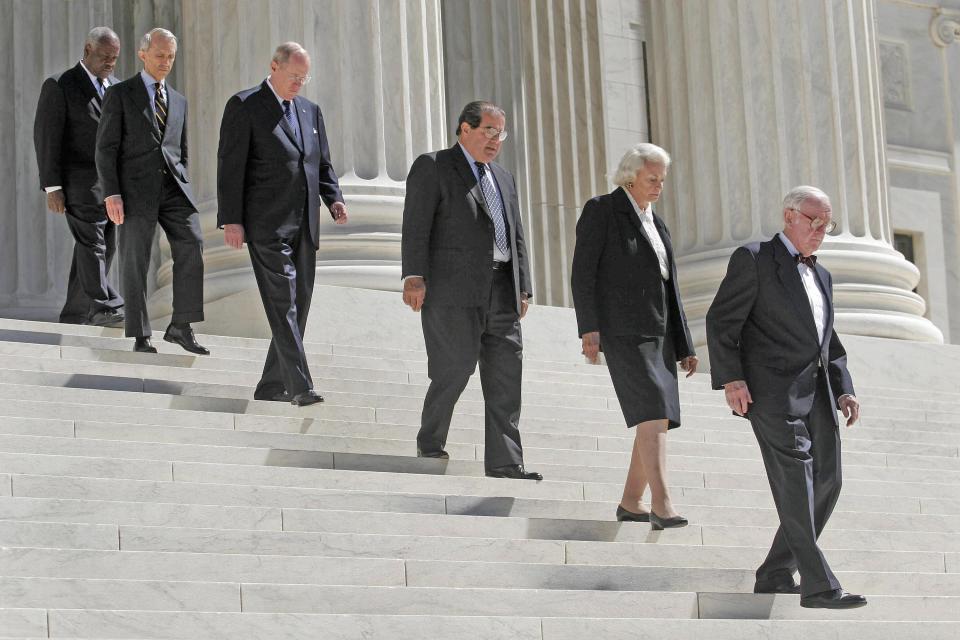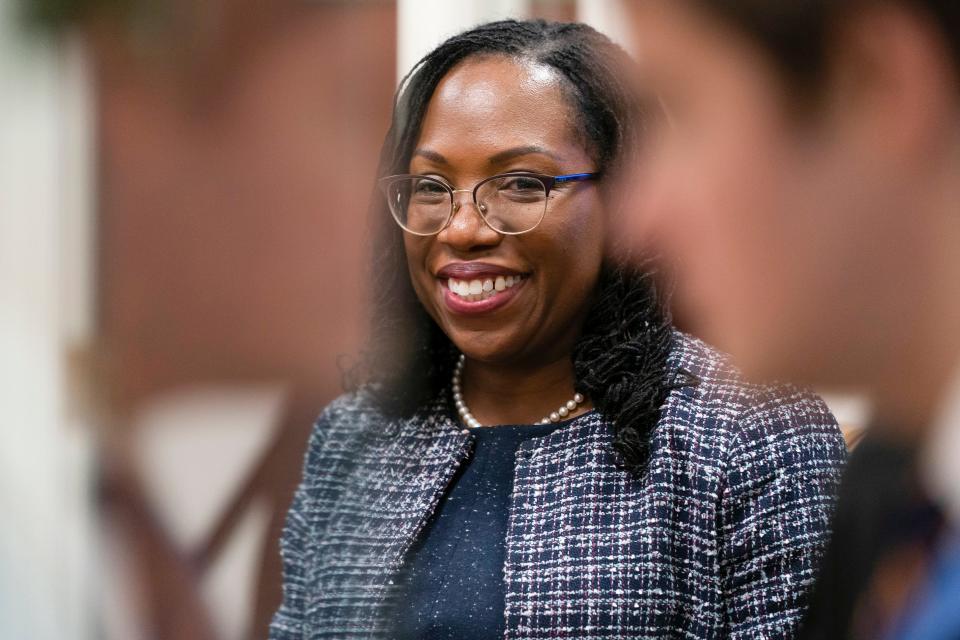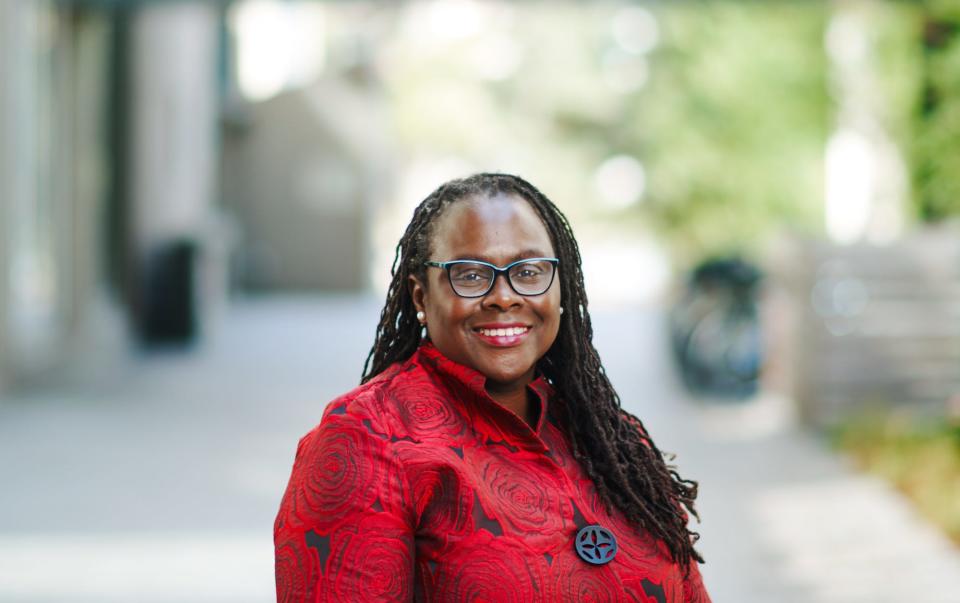Judge Ketanji Brown Jackson's lived experience as a Black mother can reshape the Supreme Court
- Oops!Something went wrong.Please try again later.
Long before I became a mother, U.S. Supreme Court decisions on "consensual encounters" with the police kept me awake at night.
Despite Fourth Amendment protections against unreasonable search and seizure without probable cause, encounters in which police approach individuals to ask them questions, examine their identification, or ask to search their possessions – all without any particular reason for suspicion – are considered consensual if "a reasonable person would understand that he or she could refuse to cooperate."
The court’s assertion that a person – particularly a Black person – would ever feel free to refuse to cooperate with the police has never made sense to me, as a Black woman. In fact, people frequently justify police killings by saying victims would still be alive if only they had complied with police directives.
Women of the Year: Each honoree has an inspiring and powerful story
It is precisely this type of thinking, along with the disproportionate rate at which Black people are stopped by the police, that has motivated Black parents to give their kids The Talk for generations, explaining what to do when stopped by the police. Stay calm. Be polite. Keep your hands on the steering wheel. Narrate your steps if you are asked to make any movements.
To be clear, The Talk doesn’t come with any guarantees. Philando Castile followed his mother's lessons from The Talk perfectly, but Officer Jeronimo Yanez still shot him dead.

If ever there were a reason to have Ketanji Brown Jackson’s voice on the Supreme Court, its jurisprudence on the Fourth Amendment and consensual encounters provides a prime example. Imagine how insights from Jackson’s life experience as a mother to two Black daughters and as a Black woman who has endured discrimination will enable her to share a perspective that has been absent on the court throughout its 232-year history. Would she endorse the fiction of a "consensual encounter" with police, the notion that any reasonable person understands they may refuse consent to search when confronted by armed, uniformed law enforcement officers?
Justices bring their personal histories to the court
Some of the most powerful moments on the court have come from a justice's insights based on their lived experience, even when those insights did not end up altering the outcome in a case. Consider how Justice Clarence Thomas enhanced the decision in Virginia v. Black, a case involving a constitutional challenge to a statute that made it a felony for person "with the intent of intimidating any person or group" to burn "a cross on the property of another, a highway or other public place."
America's fault?: Violence in Mexico is terrifying, but America has been complicit in that violence
In that case, Thomas uncharacteristically interrupted the attorney for the petitioner to articulate his understanding of a burning cross as having no purpose but "to terrorize a population." As many commentators highlighted, that insight reshaped the tenor of the oral arguments and his judicial colleagues' comments. Although the other justices certainly knew how the KKK and other vigilantes have used burning crosses for their reigns of terror, Thomas, as a Black man who grew up in the Jim Crow South with its legacy of lynchings and racial terrorism, felt it viscerally.

Although the majority of the court did not adopt Thomas's view that cross burning was conduct, not speech, they did reshape the majority opinion after hearing his view. In fact, Justice Sandra Day O'Connor, who authored the opinion, made a point of beginning the opinion with an entire section focused on the historical meaning of cross burnings in the United States.
Diversity makes the court strong
O'Connor fully recognized the fundamental importance of diverse perspectives and experiences in the federal judiciary. Upon Justice Thurgood Marshall's retirement, she spoke glowingly of his impact on the court: "Although all of us come to the Court with our own personal histories and experiences, Justice Marshall brought a special perspective. His was the ear of a counselor who understood the vulnerabilities of the accused and established safeguards for their protection. His was the mouth of a man who knew the anguish of the silenced and gave them a voice … [He] imparted not only his legal acumen but also his life experiences, constantly pushing and prodding us to respond not only to the persuasiveness of legal argument but also to the power of moral truth."

The Supreme Court is "charged with ensuring the American people the promise of equal justice under law and, thereby, also functions as guardian and interpreter of the Constitution." Representation matters. It is essential to fairness, justice and the court’s legitimacy. All of these are weakened when its justices neither look like the rest of the United States nor reflect the realities of all the nation's residents.
Confirming Ketanji Brown Jackson’s nomination is one small but important step in the right direction. There is no doubt she will, paraphrasing O’Connor’s eloquent words, impart her legal acumen and her life experiences to push and prod the court to respond not only to the persuasiveness of legal argument but also to the power of moral truth.

Angela Onwuachi-Willig is dean of Boston University School of Law and a noted scholar of critical race theory. Onwuachi-Willig is the first Black woman to lead a top 20 law school and holds the nation’s first endowed professorship in critical race theory.
You can read diverse opinions from our Board of Contributors and other writers on the Opinion front page, on Twitter @usatodayopinion and in our daily Opinion newsletter. To respond to a column, submit a comment to letters@usatoday.com.
This article originally appeared on USA TODAY: Ketanji Brown Jackson, a black mother, can reshape the Supreme Court

